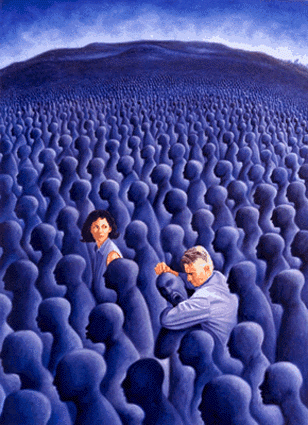Organized irresponsibility defies taking risk
Melih Katikol Cilga (aynadakileke) - 19.02.2005 12:24
I believe, Istanbul in Turkey seems to be one of the enegmatic cities to the eyes of Westerners, who are interested in the social dynamics of those "emerging markets".
This short essay provides an objective look at how the local people of a "near" country live their life...

Nobody shows respect for anyone else’s rights...
At last, the reconciliation of civilizations between Western world and Turkey started a path to develop some certain accession negotiations…
As the people of Turkey, we are supposed to rejoice in our new European future, that promises a higher quality of living and more prosperity…
But the strange thing is, however, especially local people of Istanbul, whom I recently talked to, have more safeguards and stipulations in mind than the EU diplomats have! We are a little bit reluctant to combat with the restrictions and discrepancies, just in the name of preserving our resident and mediocre mechanisms of interpersonal relationships. It is true, that mediocrity is the glue that keeps society as a rigid and closed entity. But my question is that, how long we can rely on staying as closed system that defies taking risks for any change…
Governing cultural conservativeness…
Though having an economically liberal vision, the cultural conservativeness of AKP, the ruling political party, shapes the form and the content of social relationships in the very daily life of Turkey.
There is strong correlation between “esprit de corps” and chaotic instability that is a characteristic of our fragile daily efforts for making a survival. Those who only try to save the very day, don’t worry about the conflict between “acknowledgement of deserved remuneration” and “loyalty of acquaintances”. They don’t compete with the others for marketable skills, but support their own granted relationships among each other.
Closed communities welcome intolerance and lack of confidence to different life styles, where injustice and inequality become major criteria for the usability of other social actors… To my knowledge, there are two forms of interpersonal confidence: The one, within closed circles of similar peers and walks of life. The other is between unequal and unfamiliar people. When people who don’t even know each other, can be optimistic about possible social cooperation, then it sounds reasonable to mention a democratic atmosphere and a sustainable self-esteem of social actors…
Organized irresponsibility prevails everywhere, in individuals’ minds, families, offices, state bureaucracy and all aspects of social life. Nobody shows respect for anyone else’s rights except for an unethical solidarity on mutual interests…
Entertainment and untruthfulness…
In fact, leisure and entertainment, all is a pursuit for a temporary sanctuary where we can forget the inequalities in life. And the way of entertainment that satisfies mediocre and ordinary people is an over-appreciation and flattering of their very own social status and need for a belonging.
This is a stereotypical attitude on the streets of Istanbul: Untruthfulness is an interface between them and “the others” who do not belong to a certain community. And no surprise: Post-modernism doesn’t take anything seriously: Its most powerful weapons are bitter irony and sarcasm. It defenses the right of ordinary people to make up their life story retold as an enjoying game… The correlation between this game and the organized irresponsibility is unknown... Everyone seems to be complaining from each other, since Turkish and oriental culture is based on the attitude of denial and accusation. The cruelties of social life appear in the form of exploiting “the other” people’s good will, instead of paying the price for any achievement…
Maybe the most horrible dictatorships ever, stem from social pressures, restrictions and indoctrinated orientations that are supported by the values of ethical justification. And the villains are the guards of family honor and virtue in any small city district, inquisitive people in the neighborhood who voyeur and eavesdrop our guest traffic, elderly family members who verdict traditional punishments such as sentencing to death, fathers who beat up their sons and daughters, and know-it-all losers who try to mould everyone’s thoughts into a same template… I think, the sad thing in the EU standards is the fact that, there are no written restrictions against these social villains…
As a conclusion, I would like to quote an aphorism by Ahmet Hamdi Tanpinar, probably the most important novelist of modern Turkish literature: “Only the things we love, can change together with us, and for then live with us as the prosperities of our lives, for only since they change”…
 E-Mail: aynadakileke@yahoo.com E-Mail: aynadakileke@yahoo.com
|

